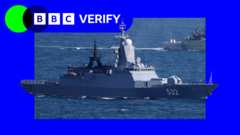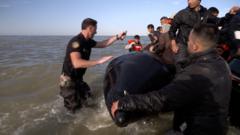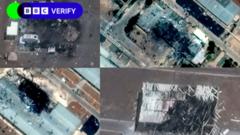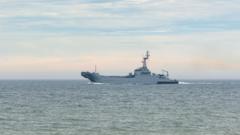An investigation has uncovered that a Russian warship, the Boikiy, camouflaged its identity using a fake ID signal while accompanying two sanctioned oil tankers through the English Channel.
### Russian Warship Uses Fake ID to Traverse English Channel with Sanctioned Tankers

### Russian Warship Uses Fake ID to Traverse English Channel with Sanctioned Tankers
**Investigation Reveals Boikiy's Disguise During Recent Passage**
The Russian corvette Boikiy has drawn attention after utilizing deceptive identification tactics to travel through the English Channel along with sanctioned oil tankers. A BBC Verify investigation revealed the ship broadcast a false ID code, causing tracking sites to misidentify it as other vessels, thus reflecting a strategic response to Western sanctions.
The recent travels of the Boikiy, armed with guided missiles, sparked international intrigue when it passed alongside two oil tankers affiliated with Russia's clandestine "shadow fleet." These tankers are known for their obscure ownership and their role in transporting sanctioned oil products. Experts suggest that this military escort may be a tactic employed by Moscow to deter interception attempts by Western nations, including the UK.
The Boikiy's journey, beginning in West Africa, has seen it travel without activating its Automatic Identification System (AIS), a broadcast typically mandatory for vessels at sea. Instead, its peculiar use of identification signaled an unusual approach for Russian naval vessels. Following its path, the Royal Navy reportedly monitored Boikiy's movements through the Channel, revealing the heightened tensions around maritime activities in the region.
As the three vessels appeared to be moving toward Baltic waters, the international community is left questioning their final destinations, with speculations arising regarding possible ports in Russia or the Kaliningrad exclave. The incident highlights the growing complexities of naval operations amid geopolitical adversities and sanctions.
The recent travels of the Boikiy, armed with guided missiles, sparked international intrigue when it passed alongside two oil tankers affiliated with Russia's clandestine "shadow fleet." These tankers are known for their obscure ownership and their role in transporting sanctioned oil products. Experts suggest that this military escort may be a tactic employed by Moscow to deter interception attempts by Western nations, including the UK.
The Boikiy's journey, beginning in West Africa, has seen it travel without activating its Automatic Identification System (AIS), a broadcast typically mandatory for vessels at sea. Instead, its peculiar use of identification signaled an unusual approach for Russian naval vessels. Following its path, the Royal Navy reportedly monitored Boikiy's movements through the Channel, revealing the heightened tensions around maritime activities in the region.
As the three vessels appeared to be moving toward Baltic waters, the international community is left questioning their final destinations, with speculations arising regarding possible ports in Russia or the Kaliningrad exclave. The incident highlights the growing complexities of naval operations amid geopolitical adversities and sanctions.




















